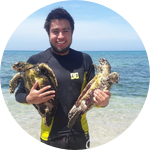About This Project
Whale sharks (Rhincodon typus) face growing threats from human activities, particularly in ecotourism hotspots like Bahía de La Paz in México, designated as the Refuge Area for the Protection of Whale Sharks. This project uses drones to monitor whale shark populations, capturing behavioral patterns and identifying injuries from boat strikes and close encounters. The data will provide insights into ecotourism’s impact on whale sharks and inform sustainable management strategies.
Ask the Scientists
Join The DiscussionWhat is the context of this research?
Whale sharks (Rhincodon typus), classified as Endangered by the IUCN Red List, face growing threats in high-tourism areas like Bahía de La Paz. Boat collisions and human disturbances cause injuries that affect their health, behavior, and overall survival. Despite regulatory efforts such as establishing the Whale Shark Refuge Area in 2018, this species remains at risk from boat strikes and other human impacts. Drones provide a non-invasive, cost-effective solution for collecting high-resolution data on whale shark behavior and injuries, minimizing disturbance. This innovative approach enhances our ability to develop more effective conservation strategies, protecting this endangered species amid growing human activity and the expanding influence of ecotourism.
What is the significance of this project?
Bahía de La Paz, recently designated as a Marine Protected Area (MPA) for whale shark conservation, requires enhanced data to evaluate the effectiveness of its protection measures. This project aims to document, quantify, and assess the injuries sustained by whale sharks within the MPA, while collecting valuable data on their behavior and the impact of ecotourism to support ongoing monitoring of this species. The project will provide key recommendations to improve MPA regulations, ensuring sustainable eco-tourism and the long-term protection of whale sharks and their habitats. By reducing harm from boat strikes and human disturbances, this project will contribute to the long-term survival of the whale shark population and play a vital role in the broader conservation of marine ecosystems.
What are the goals of the project?
Funds will be allocated to acquire drone equipment, cover operational expenses, and compensate students and researchers. Drone flights will occur three times per week during the whale shark swimming season (October to April) and once a week during the off-season. The focus will be on tracking the number of whale sharks with injuries and behavioral changes caused by boat interactions, as well as monitoring their presence during the off-season. This data will evaluate ecotourism’s impact on whale sharks and guide the development of more effective conservation strategies and automated methods for future monitoring. Additionally, the project will train the research team and local staff on drone operation and data collection to ensure accurate and sustainable monitoring practices.
Budget
Our whale shark research project relies on key budget items for its success. The drone equipment (4,843 USD) will be used for non-invasive monitoring, providing essential data on whale sharks. The transportation budget (1,500 USD) covers fuel costs for accessing the field site, ensuring reliable data collection. The food budget (1,000 USD) will support the research team during fieldwork, allowing uninterrupted data collection. Student stipends (1,500 USD) will involve local students, offering valuable research experience. Publication and outreach (1,000 USD) will fund sharing findings with the scientific community and local stakeholders. These resources will ensure the research is effective, maintain momentum, and contribute to the long-term conservation of whale sharks.
Endorsed by
 Project Timeline
Project Timeline
The project will begin in March 2025, with monitoring equipment in place. Drone flights will occur twice a week until April 30, 2025, and weekly from May to August 2025 during the off-season. Data will be reviewed and processed in September 2025 in preparation for the next season. Flights will resume three times a week from October 2025 to April 2026. Data collection will end in April 2026, followed by analysis and the creation of outreach materials and publications by September 2026
Jan 06, 2025
Project Launched
Feb 28, 2025
Equipment Acquisition and Training. Secure drone equipment. Provide training for the research team and local staff on drone operation and data collection techniques
Apr 30, 2025
Data Collection Phase I (High Season - 2 times a week). Begin drone monitoring in the Bahía de La Paz Refuge Area, during the peak of the whale shark swimming season.
Oct 31, 2025
Data Collection Phase II (Low Season - 1 time a week). Continue monitoring whale shark populations during the off-season, focusing on seasonal trends and long-term impacts.
Nov 30, 2025
Data Analysis and Preliminary Report. Analyze collected data, including behavioral patterns and injuries. Draft a preliminary report with insights on the impact of ecotourism.
Meet the Team
Affiliates
Affiliates
Team Bio
Our team combines expertise in marine conservation, advanced research methodologies, and local knowledge to ensure the success of this project. With a shared commitment to protecting vulnerable marine species, the team brings scientific expertise and technical skills to implement innovative strategies and achieve a lasting impact on conservation efforts in Bahía de La Paz.
Fabian Missael Rodríguez González
Fabian Missael Rodríguez González is a researcher at PRIMMA (Marine Mammal Research Program) at the Universidad Autónoma de Baja California Sur (UABCS), Mexico, where he earned his B.Sc. in Marine Biology and M.Sc. in Marine and Coastal Science. Since 2016, he has been actively involved in marine research, leading various projects. With over eight years of experience in the LSIESP (Laguna San Ignacio Ecosystem Science Program), Gray Whale Research Project in Baja California Sur, he currently serves as a research leader, focusing on body condition assessment using drone technology. Fabian has co-authored three scientific papers and contributed to two chapters in the book Sex in Cetaceans. From 2021 to 2023, he was a teaching assistant at UABCS. In 2024, he worked as a drone pilot for the National Marine Mammal Foundation, assisting with monitoring efforts for the endangered vaquita porpoise. His research interests include marine conservation, species monitoring, and the application of technology in environmental management. Fabian is dedicated to advancing marine science and conservation through local community engagement, education, and the use of innovative tools to ensure the sustainability of marine ecosystems.
Dilan Ricardo Ramos Ávila
Dilan Ricardo Ramos Ávila is a research-professor at UABCS (Universidad Autónoma de Baja California Sur, Mexico) and phD student at this institution. He is a marine biologist and M.Sc. in Marine and Coastal Science with an orientation in marine ecology. Since 2017 he has been leading projects with organized community groups to preserve priority species such as sea turtles and their environments in collaboration with the CONANP (Comisión Nacional de Áreas Naturales Protegidas). Dilan has participated in more than five scientific papers as co-author and one as first author. He has written one book chapter and collaborated on three others. His research interests include environmental protection, interaction between species and human activities and spatial ecology.
Hugo Sanchez Gomez
Since childhood, I have always been fascinated by marine life, especially sharks and rays. Nowadays, the dreams I had as a child are starting to come true. Throughout my academic journey, I have had the opportunity to work with artisanal fisheries, local ecological knowledge, and baited remote underwater video systems (BRUVS) to study elasmobranchs and teleosts in the Gulf of California and the Revillagigedo Archipelago. I am currently pursuing my PhD at El Colegio de la Frontera Sur, where I study the population genomics of a vulnerable shark species, the Blacktip Shark (Carcharhinus limbatus), in order to enhance our understanding of its connectivity in the Eastern Tropical Pacific, which may contribute to the establishment of new marine corridors in the region.
Additional Information
This project will leverage existing relationships with local stakeholders, such as tour operators and conservation organizations, to integrate findings into ongoing conservation efforts. It aims to raise awareness about sustainable ecotourism and promote whale shark protection. Training will be provided to the research team and local staff on drone technology for future monitoring. As ecotourism grows, this study addresses the need for evidence-based strategies to protect vulnerable species like whale sharks, using drone technology to fill research gaps and enhance conservation efforts.
Project Backers
- 8Backers
- 100%Funded
- $9,843Total Donations
- $1,093.67Average Donation



